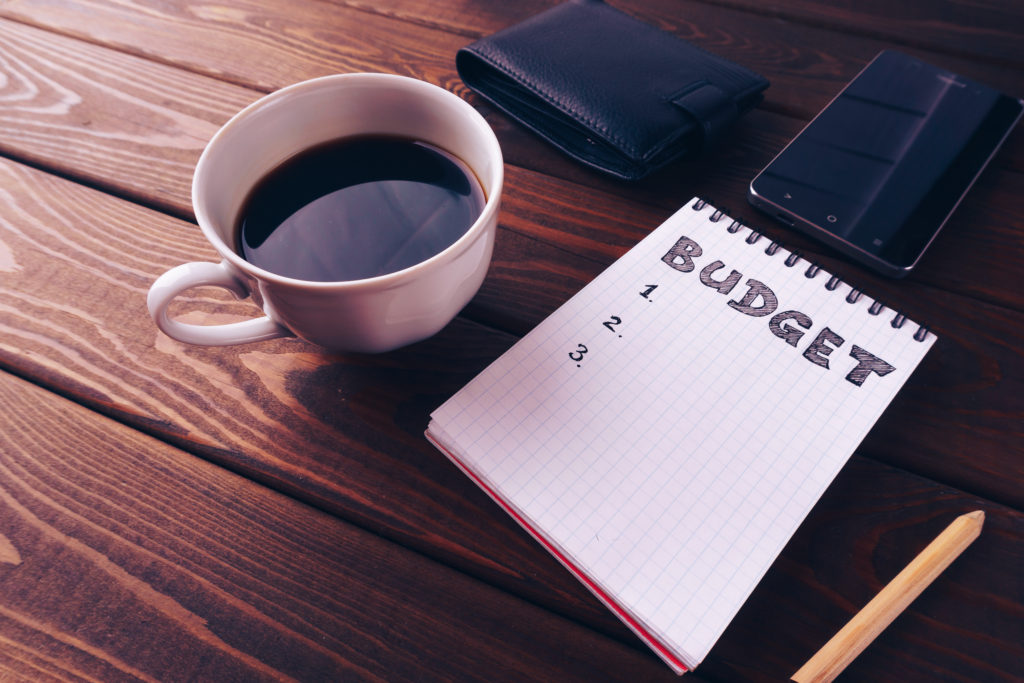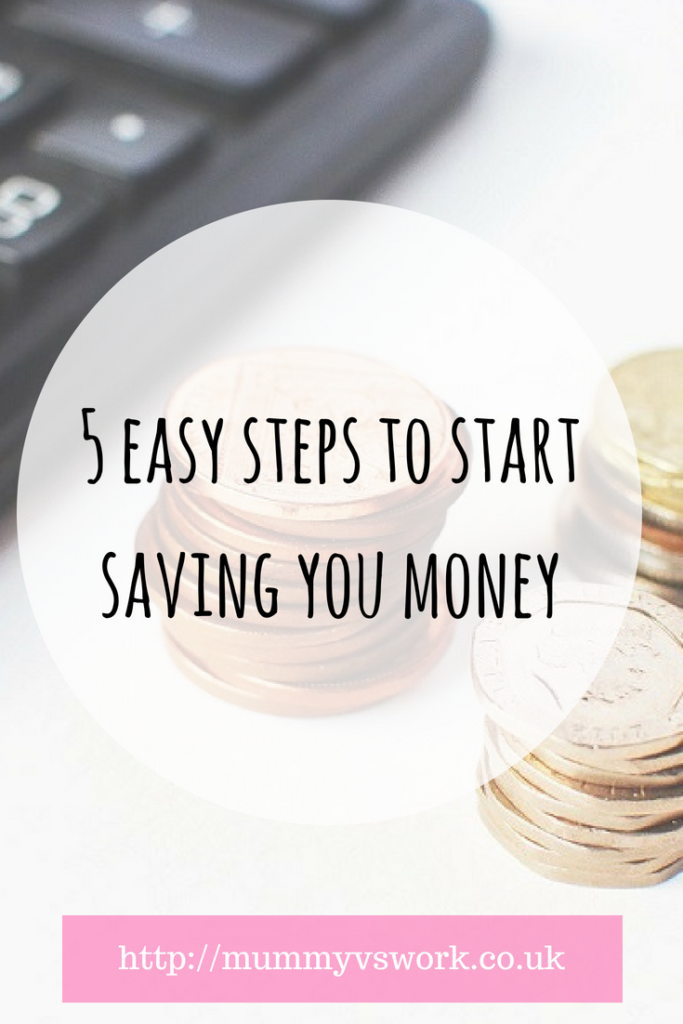5 easy steps to start saving you money
This post is written by the lovely Francesca who blogs over at From Pennies to Pounds. Her blog is packed full of more great ideas and help like this one on how to not only save money but make extra money so make sure you check it out!
Write down everything you spend
The best way that you can save money? Seeing how much you have been spending! There is no way that you can argue about how much money you spend when you see it all written down in black and white, so this is something that I recommend you do.
It’s usually referred to as tracking your spending – a good way to do this is to get a notebook (or use Excel or something similar if that’s what you prefer) and keep a spending log. Write down every single little thing, whether you pay cash or cheque for it. Keep your receipts – they will help you to remember the exact amounts!
You can also go back through your bank statements – either online on your internet banking, or on your paper statements) and see how much you have been spending in previous months.
This isn’t to make you feel bad or guilty about how much you have been spending – but instead to allow yourself to see where you may have some leaks in your ship!
Automate Everything
This is SO important – so important that it needed capital letters! We may set out with the very best of intentions with things, particularly our finances, but life gets in the way. We get ill, our loved ones get ill, we do a ton of work and overtime and are exhausted.
We are only human after all and can’t remember everything. As important as paying your debt is off to you, when you have an emergency crop up, it will probably be the last thing on your mind.
The solution to this?
Automation.
I don’t know what people did before internet banking (I think I would have probably ended up living in a bank the amount of time that I spend on my internet banking), but we are fortunate to live in an age where things can be easily sorted with the click of a button.
Everything that you can automate, do it. Set up direct debits for your bills and you will never miss a payment. Set up standing orders for money to be taken out of your account and put into savings. Both of these are important, because if you miss a payment on a bill, it will affect your credit score, and you will probably have unplanned for interest to pay on it. You literally pay for the fact that you forgot to pay it!
When it comes to savings, what we tend to do – yes, I have been guilty of it myself and am of course generalising here as not every single person does this – is pay our bills, and then spend what is left after.
Whilst I’m a huge advocate of having fun (I’m not about that extreme frugal life), if you have goals that you are trying to achieve, they’re going to be pretty impossible to reach if you aren’t saving any of that cash that you have worked so hard to make.
But never fear, for there is a solution to everything! You can set it up within your bank account for an amount to be transferred into your savings every month, and you can set the amount and date etc yourself.
The best thing about doing this is that you forget that you had the money there and end up not missing it…so the savings add up and up, getting you ever closer to your goal.
Zero Sum Budget
This goes in line with what I have mentioned above, and is a great way of budgeting, especially for beginners who may struggle with saving any money even though they can afford to, on paper.
Zero sum budgeting is the method where all of your money is allocated each month – so instead of paying your bills and then spending whatever is left after, you allocate all of your money so that you don’t just have ‘free’ money that is floating around, because let’s face it…we will probably want to spend it!

Please don’t think that I am suggesting that you never spend any of your money on yourself – because you absolutely can – it’s just up to you to decide what the spending categories are.
An example is if you have £300 left over after bills each month, and usually end up spending it on random stuff, you can instead allocate it to categories – the reason that it’s called a zero-sum budget is because all of your money gets allocated to categories.
Examples could be:
- Savings
- Sinking fund
- Emergency fund
- Christmas
- Birthdays
- Entertainment
- Date night
As you can see, it’s completely up to you to decide what you want to spend your money on – it’s all about making you more aware of how much you are spending, having a plan for your money, and making sure that some is saved.
Switch Supermarkets
Sounds simple but can make a HUGE difference to how much you are spending on your food shopping each month. The cost of groceries can vary wildly each month and between different households too!
Food is something that we love, so we tend to buy a lot of it, and can buy based on emotional thoughts – but if you plan out your meals and do things like having a day with no meat, you can save a lot of money.
There are other ways that you can save as well, such as bulk cooking which is where you cook a lot of meals and/or snacks at once, so that you are prepared for the week ahead (you can freeze the meals and defrost when needed).
However, one of the best ways to save money on grocery shopping is to change your supermarket. If you are shopping at one of the big supermarkets such as Tesco, Asda, Sainsbury’s, Waitrose etc – it is not surprising that your food bill may be quite high, as they are quite expensive shops.
I am a huge advocate of Lidl, and I know that Aldi is very similar (don’t have one anywhere near me to try out though unfortunately!) and encourage everyone to try them out.
They are great because the prices are really low, but the quality doesn’t suffer because of this – the meat in particular is very good, as is the fruit, veg etc.
You also have another plus point – they don’t have a lot of the goods on offer that may tempt you to buy other things like they do in the big supermarkets, such as TV’s, toys etc – they do have some of that stuff in there, but the scale is much less.
Find Free Entertainment
Entertainment is another chunk of the budget which can escalate quickly and varies drastically from person to person – it could be in the form of: eating out, going to cinema, out for drinks, going shopping. Then there’s things with the kids such as trips to the cinema, soft play, going to the shops and buying them toys, magazines…etc etc. It seems never ending!
But it’s ok, because there are in fact loads of free things that you can do for fun, and they won’t be boring either. It’s usually all about the company you keep anyway!
Some free entertainment ideas, for either you and your partner/friends or with the kids, could be:
Trip to the beach
Day at the park (this is all kids need for entertainment really!) Geocaching Picnic Museum (lots have free entry) Use vouchers such as Tesco Clubcard ones for a meal out Do mystery shopping at a restaurant for a free meal (and a fee!) Home cinema Bike ride Library trip These are just a few ideas but there are a ton more things that you could do, and as you can see from the examples above – you can go out or stay in and still have a good time without spending a lot of money.
And in fact, you may find that you have an even better time compared to the times you have expensive plans. There are also lots of other ways to save money which includes shopping online for example and using sites like dealsqueen to save you money on your purchases.
What are some ways that you save money?

This is a collaborative post